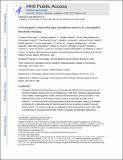Immunogenic Chemotherapy Sensitizes Tumors to Checkpoint Blockade Therapy
Author(s)
Pfirschke, Christina; Engblom, Camilla; Rickelt, Steffen; Cortez-Retamozo, Virna; Garris, Christopher; Pucci, Ferdinando; Yamazaki, Takahiro; Poirier-Colame, Vichnou; Newton, Andita; Redouane, Younes; Lin, Yi-Jang; Wojtkiewicz, Gregory; Iwamoto, Yoshiko; Mino-Kenudson, Mari; Huynh, Tiffany G.; Hynes, Richard O.; Freeman, Gordon J.; Kroemer, Guido; Zitvogel, Laurence; Weissleder, Ralph; Pittet, Mikael J.; ... Show more Show less
Downloadnihms752883.pdf (2.947Mb)
PUBLISHER_CC
Publisher with Creative Commons License
Creative Commons Attribution
Terms of use
Metadata
Show full item recordAbstract
Checkpoint blockade immunotherapies can be extraordinarily effective, but might benefit only the minority of patients whose tumors are pre-infiltrated by T cells. Here, using lung adenocarcinoma mouse models, including genetic models, we show that autochthonous tumors that lacked T cell infiltration and resisted current treatment options could be successfully sensitized to host antitumor T cell immunity when appropriately selected immunogenic drugs (e.g., oxaliplatin combined with cyclophosphamide for treatment against tumors expressing oncogenic Kras and lacking Trp53) were used. The antitumor response was triggered by direct drug actions on tumor cells, relied on innate immune sensing through toll-like receptor 4 signaling, and ultimately depended on CD8 + T cell antitumor immunity. Furthermore, instigating tumor infiltration by T cells sensitized tumors to checkpoint inhibition and controlled cancer durably. These findings indicate that the proportion of cancers responding to checkpoint therapy can be feasibly and substantially expanded by combining checkpoint blockade with immunogenic drugs.
Date issued
2016-02Department
Massachusetts Institute of Technology. Department of Biology; Koch Institute for Integrative Cancer Research at MITJournal
Immunity
Publisher
Elsevier BV
Citation
Pfirschke, Christina et al. “Immunogenic Chemotherapy Sensitizes Tumors to Checkpoint Blockade Therapy.” Immunity 44, 2 (February 2016): 343–354 © 2016 Elsevier Inc
Version: Author's final manuscript
ISSN
1074-7613
1097-4180